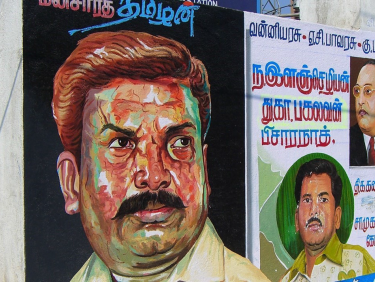Faculty of PhilosophyCommunication, Literature and Media in Modern South Asian Languages
The Master’s degree programme in Communication, Literature and Media in Modern South Asian languages explores the different languages, literatures and media discourses of the Indian subcontinent (texts, manuscripts, films, internet and audio sources).
The Master’s degree programme considers aspects of modern South Asia as reflected in text, culture and media. The term “South Asia” refers to the Indian subcontinent which today has a population of approximately 1.5 billion people - more than a fifth of the world’s total population. South Asia is home to numerous different cultures, ethnicities and religions, as well as languages and literatures. The core languages which can be studied as part of the degree programme include Bengali, Hindi, Urdu, and Tamil. Theoretical modules offer students insight into topics relating to linguistics, literary and media studies, as well as translation processes. The primary objective is comparative analysis of original linguistic sources from South Asia. Theoretical approaches from the fields of cultural and religious studies are also explored.

Special Features and Characteristics
The South Asian Institute (Südasien-Institut, SAI) is one of Europe’s leading centres for study of South Asia. The Institute is part of an active, international research network. Together with satellite centres in different countries in South Asia, the Institute serves as an ideal platform for interdisciplinary teaching and research. The modern library has one of the world’s most comprehensive collections of South Asian texts. The SAI regularly offers summer schools for a variety of South Asian languages and also cooperates with other summer schools in Germany.
Research
The Department of Modern South Asian Languages focusses primarily on linguistic and textual manifestations of contemporary South Asian cultures. The analysis of different media and literatures of South Asia is complemented by the Department’s research into other, varied aspects of modern South Asian culture, including history, culture, religions and politics. A central focus of the research undertaken by the Department is the complex processes of exchange which take place in a globalised world. These are reflected in the transformations seen in South Asia cultures. As part of different research projects, the Department investigates for example the use of satire in South Asia as a means of constructing identity during the colonial period, and the position of the Hindu minority in Pakistan. Further projects address issues surrounding the concept of religion and the multiple, associated processes of interpretation which take place in the South Asian context, as well as the connection and reflection of processes of social change in South Asia literature, and in visual portrayals.
Occupational Areas
Graduates of the Master’s degree programme might pursue employment in one of the following fields:
- in the media industry
- in communications and translation agencies
- in training and consulting institutions
- in tourism
- in universities and research institutes
- in national and international NGOs
- in diversity management
- in work with refugees, migrants
- in cultural mediation
- in state institutions
Degree variants
Master, consecutive
Learn more
Insights

The academic programme in Communication, Literature and Media in Modern South Asian Languages allows me to, on the one hand, study the languages and literature of South Asia while the multidisciplinary module offers me a wide range of choices.
Anne Keienburg, 29, Communication, Literature and Media in Modern South Asian Languages, 3rd semester Master




